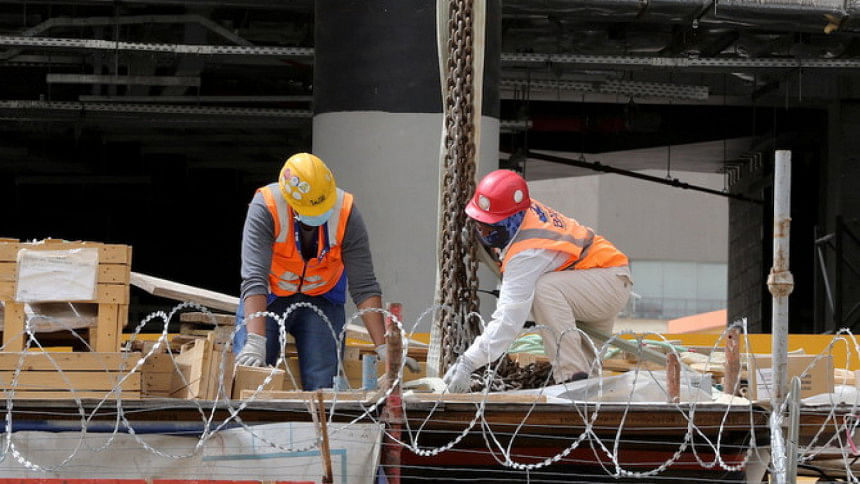Lack of language skills leaves migrants vulnerable

Although a large number of Bangladeshi migrant workers travel to the Gulf countries for work, there has been little to no government initiative to teach them the languages of the receiving countries.
Currently, migrant workers going to the Gulf can have brief language lessons during a three-day mandatory pre-departure orientation (PDO). Besides, a two-month housekeeping course designed for only female workers incorporates lessons on Arabic language.
Although several training centres under Bureau of Manpower, Employment and Training (BMET) currently offer separate courses on Korean and Japanese languages, they do not conduct Arabic language courses now.
Officials said there has been a lack of interest from the workers to undergo Arabic language training, while relevant receiving countries also do not consider such skills as mandatory requirements for the job.
Labour migration experts, however, said life skills like language proficiency are crucial for a migrant worker to flourish overseas, and not being able to communicate in that language could put them in multi-faceted challenges, including exploitation.
Life skills like language proficiency are crucial for a migrant worker to flourish overseas, and not being able to communicate in that language could put them in multi-faceted challenges, including exploitation.
Shakirul Islam, chairperson of Ovibashi Karmi Unnayan Program, said language lessons in the current PDO module are inadequate, as it is not possible to teach someone a foreign language like Arabic in just three days.
He said without knowing and understanding Arabic properly, Bangladeshi female domestic workers in Saudi Arabia face exploitation from the beginning.
Also, language deficiency puts male migrant workers in a position without "negotiation capacity," since such shortcomings make them unable to access the complaint mechanism in cases of rights violations, he said.
Currently, BMET, under the Expatriates' Welfare and Overseas Employment Ministry, oversees the skills training of aspirant migrant workers at more than 100 facilities, including technical training centres (TTCs) and institutes of marine technology (IMTs), across the country.
A top official of BMET said they currently do not offer separate courses on Arabic language.
The official said language proficiency is not a mandatory requirement for jobs in the Gulf countries, as opposed to Japan and South Korea, which made proficiency in their languages a mandatory requirement for jobs.
He, however, affirmed that with better proficiency in the languages of the host countries, Bangladeshi migrant workers could do better.
BMET's housekeeping training manual incorporates Arabic language in the "language and communication skill" unit, one of seven units.
In 10 sub-units, it incorporates Arabic words used in everyday life, for domestic jobs, names of Arabic days, months, and numbers, and short and simple sentences required at airports, households, and for primary healthcare.
On the other hand, the PDO manual incorporates only a handful of words and simple sentences used in everyday life.
Returnee migrant worker Abdur Rahim, 42, said he worked in Kuwait for several years between 2001 and 2017 but went there without knowing Arabic.
He said it put him in a lot of trouble initially, especially when he needed to converse with his Kuwaiti employer.
"In such situations, I had to depend on other Bangladeshis who knew Arabic," he said, adding he later learned the language with the help of some Arabs.
He also said Bangladeshi workers with better Arabic proficiency can get better jobs in Kuwait.
If a worker knows the language and seeks a job at a shopping mall, he can get a salesman's job and even earn Tk 50,000 a month. If he doesn't know the language, then he will most likely get a cleaner's job and earn Tk 20,000 a month, he added.
An official at Bangladesh-Korea Technical Training Centre, one of the training centres under BMET in the capital, said they started an Arabic language course five to six years ago but did not continue due to a lack of students.
Contacted, Md Ruhul Amin, secretary of the expatriates' welfare ministry, recently told this newspaper that they will start an Arabic language course next year.
A total of 1.25 crore workers have migrated from Bangladesh since 2004, of which over 73 percent were recruited by six Gulf Cooperation Council (GCC) countries -- Saudi Arabia, Oman, Kuwait, United Arab Emirates, Qatar, and Bahrain.
According to a list of BMET, currently 38 TTCs and five IMTs offer Japanese language courses, 30 TTCs and two IMTs offer Korean language courses, three TTCs offer Cantonese and one TTC offers Mandarin language courses.
Besides, 15 TTCs and one IMT offer English language courses.
Shakirul of Okup said while learning the languages of host countries is essential, there should be an initiative so that more aspirant migrants can at least have training on basic English as it is an international language.
NO LANGUAGE COURSE ON MALAY
Like Gulf countries, Malaysia is another regular and large destination for Bangladeshi workers, but BMET-run training centres do not offer courses on Malay, the national language of Malaysia.
An official at BMET said they have no plan to offer the course anytime soon.
Malaysia hired 9.59 percent of the migrant workers, who migrated from Bangladesh since 2004, according to BMET.

 For all latest news, follow The Daily Star's Google News channel.
For all latest news, follow The Daily Star's Google News channel. 








Comments